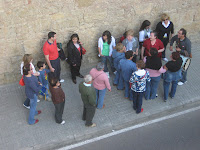The King's Shropshire Light Infantry were here in town last month to lay a wreath at the tomb of Major General Robert Craufurd. He died, leading from the front, when Wellington's troops stormed Ciudad Rodrigo on 19 January 1812. When Alan Crawford was here earlier this week we went to the Portuguese town of Almeida which, like Ciudad Rodrigo, has substantial fortifications. Almeida was besieged, and taken, by the French in 1810 as they chased the British back to Torres Vedras near Lisbon. In Fuentes de Oñoro, we tried to buy bread, but in May 1811 nearly 4,000 troops died there as the French attempted to advance back into Portugal from their base in Ciudad Rodrigo. They had been back in Spain sprucing themselves up after taking a bit of a pasting flinging themselves against those defences at Torres Vedras. These various jaunts made me realise that I didn't really know much about the Peninsular War, as we Brits call it, or the War of Independence as the Spanish call it. So h...


















